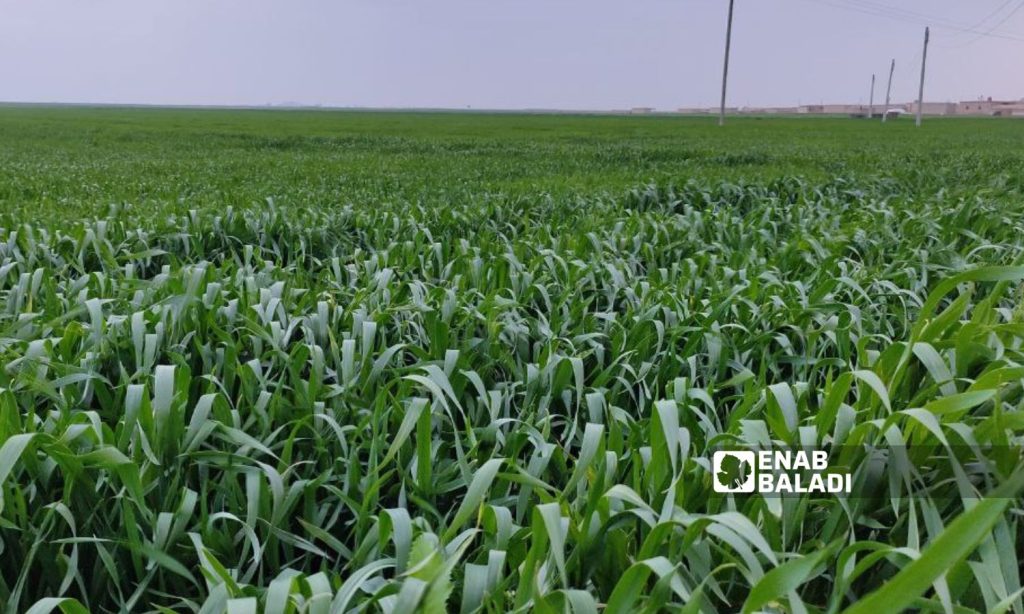Al-Hasakah – Majd al-Salem
Many farmers in al-Hasakah governorate depend on cash advances to cover the cost of agricultural operations and supplies, such as seeds, fertilizers, equipment, and tillage, but the high-interest rates on these advances have put many farmers in a difficult financial situation.
Two consecutive years of drought inflicted heavy losses on Ahmed al-Hussein’s agricultural crop in the southern countryside of Qamishli and consumed his grain stocks and the financial liquidity needed for farming operations during the next season.
The improvement in the level of rain, which brought with it an improvement in agricultural production for the current year, was not as joyful as it used to be for al-Hussein, given the amount of debt that he incurred as a result of what is known locally as “dealing with cash advances.”
Unreasonable interests
According to what al-Hussein told Enab Baladi, the phenomenon of the “cash advances” is a debt of an amount from one of the well-to-do, provided that the farmer returns it during the sale of the crop, with an increase agreed upon between the two parties.
The problem with this habit, which has spread widely in al-Hasakah governorate recently, lies in the absence of a “reasonable percentage” of “interest” in the increase imposed by the creditor on the amount, especially since the matter depends on the size of the crop that the farmer will produce at the end of the season.
Al-Hussein told Enab Baladi that he borrowed $600 in order to cultivate his land and secure what it needed in terms of seeds, fertilizers, and agricultural service operations. He had to pay interest of up to 40 percent, as he must return the $600 he borrowed, in addition to another $240.
“Very high interest on the principal amount (cash advance), capable of absorbing any profits that the farmer may reap from his crop, regardless of its condition and good productivity,” al-Hussein added.
New-old problem
The problem of advances with high-interest rates is not new to al-Hasakah farmers, who have suffered during the past years from drought and their inability to compensate for any of their losses, but it has become popular with the deterioration of living conditions in the region.
Agricultural engineer Tariq al-Ayed of Qamishli countryside described the problem as “endemic and intractable” due to the difficult conditions experienced by farmers and the lack of financial support for the agricultural sector in the region.
In addition, merchants exploit the need of farmers, who find no other source of financing their business than borrowing at high-interest rates, according to al-Ayed.
The deterioration of the value of the Syrian pound against the dollar has transformed the financial advance into US dollars so that the merchant does not lose his money as a result of the constant change in the exchange rate after it was in the Syrian currency and production requirements are now priced in dollars as well, the agricultural engineer added to Enab Baladi.
The situation of farmers today is different from that of the past, as their debts have become in dollars, and they are constantly increasing with the deterioration of the value of the Syrian pound, which constitutes a burden on the shoulders of farmers to the extent that it prompted many of them to abandon agriculture altogether, despite the fact that they own large areas of land that they have become “unable to cultivate.”
Some may resort to the “share farming” system, as a trader invests the farmer’s agricultural land on condition that he gives him 50 percent of the land’s production, for example, but this does not cancel the “accumulated” debts owed by the farmer, according to the agricultural engineer.
Farmers do not resort to financial advances only to manage their affairs. A large section secures what it needs of seeds and fertilizers “with money advances.” If the price of a ton of fertilizer is $600, the merchant records the price of a ton to the farmer at $850 in case he sells it on credit, according to the engineer.
What does the law say?
The term “obscene usury” refers to large interests that are added to sums borrowed between two parties, and it is considered a crime punishable by Syrian law, and it is the same law adopted by the Autonomous Administration in northeastern Syria in dealing with the same matter.
According to the Syrian Lawyers Forum, which specializes in providing free legal advice, Syrian law criminalizes charging “obscene usury,” but it must be proven that the defendant charged interest in excess of the legal limit estimated at 9 percent.
Abdulrahim, a lawyer who resides and works in the areas under the control of the Autonomous Administration in al-Hasakah governorate, who kept his full name for fear of being held accountable, told Enab Baladi that the office in which he works in the city of Qamishli is regularly frequented by individuals seeking their rights in usury cases, most of whom are farmers.
The lawyer added that obtaining rights through the law applied by the Autonomous Administration in the region has become almost impossible, especially since merchants lend farmers money or agricultural equipment and supplies, according to debt bonds for the amount with its interest.
Suppose that the farmer borrowed $600 and must return $1,000 to its owner. The legal document proves that the farmer borrowed $1,000. Therefore, the case of “obscene usury” cannot be proven in this type of legal case in the region, according to the lawyer.

